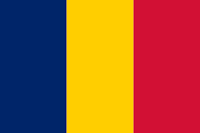 Chad—its sometimes call the “Dead Heart of Africa.” It’s a long way from the sea, and is mostly in a desert zone—including, of course, a swathe of the Sahara. I actually didn’t know until today that the capital is N’Djamena. In fact, I’d ashamed to say I had never even heard of N’Djamena. Chad is a melting pot—over 200 ethnic and linguistic groups, though the official languages are French and Arabic. The former comes from the countries time as a French colony: Chad gained its independence from France on 11 August, 1960, leading us to today’s Chadian Independence Day. The French period was practically a blink of the eye in terms of the countries timeline—though of course those colonisers had a big impact for a relatively short stay. Still, the French only officially moved in in 1920—so Chad spent a mere 40 years under French control, while there have been people living in the region since the 7th millennium BCE.
Chad—its sometimes call the “Dead Heart of Africa.” It’s a long way from the sea, and is mostly in a desert zone—including, of course, a swathe of the Sahara. I actually didn’t know until today that the capital is N’Djamena. In fact, I’d ashamed to say I had never even heard of N’Djamena. Chad is a melting pot—over 200 ethnic and linguistic groups, though the official languages are French and Arabic. The former comes from the countries time as a French colony: Chad gained its independence from France on 11 August, 1960, leading us to today’s Chadian Independence Day. The French period was practically a blink of the eye in terms of the countries timeline—though of course those colonisers had a big impact for a relatively short stay. Still, the French only officially moved in in 1920—so Chad spent a mere 40 years under French control, while there have been people living in the region since the 7th millennium BCE. Following independence there has been a bit of tension—the first president, François Tombalbaye proved unpopular after a few years—a civil war broke out in 1965 that lasted a long time. There was a coup in 1990, and then more recently the Darfur crisis has spilled over from neighbouring Sudan into some areas of Chad, causing a few problems.
 This year saw the Battle of N’Djamena (which makes me even more ashamed I didn’t know the capital). On 2 February Charian rebel forces entered the capital, initially taking on a large part of the city, attacking the presidential palace. The palace didn’t fall, though, and within a few days the government’s troops had pushed the rebels out of the city, and they retreated. It has been the first revel attack—there was another failed attack in April 2006. There was a peace agreement signed last year in October 2007—but that collapsed a month later. There’s concern that what has been considered a humanitarian crisis in the country could become a humanitarian “catastrophe.”
This year saw the Battle of N’Djamena (which makes me even more ashamed I didn’t know the capital). On 2 February Charian rebel forces entered the capital, initially taking on a large part of the city, attacking the presidential palace. The palace didn’t fall, though, and within a few days the government’s troops had pushed the rebels out of the city, and they retreated. It has been the first revel attack—there was another failed attack in April 2006. There was a peace agreement signed last year in October 2007—but that collapsed a month later. There’s concern that what has been considered a humanitarian crisis in the country could become a humanitarian “catastrophe.” I had a hard time finding texts from Chad—there are a few writers (including Joseph Brahim Seïd, Baba Moustapha, Antoine Bangui and Koulsy Lamko), but their work is hard to find. I still hope to track some down at some point. In the meantime, while I was ferreting around in the strange places this project takes me, I found an account of the legend of how the Buduma tribe—who primarily living on the islands of Lake Chad—came to Chad. It’s from P. A. Talbot’s article “The Buduma of Lake Chad” which appeared in the The Journal of the Royal Anthropological Institute of Great Britain and Ireland, Vol. 41, (Jul. - Dec., 1911).
A Kanembu, Bulu by name, fell in love with his sister-in-law during the absence of his elder brother, who had gone on a pilgrimage to Mecca. As the latter’s return was delayed, the pair took his death for granted, and went through a form of marriage. On the husband’s return Bulu feared punishment for his misdeed, so he fled to Lake Chad, and lived in hiding on one of the islands. He was obliged to live on fish or such small game as he could snare, till one day a great calabash of millet was found entangled in the reeds which fringed his place of retreat. Bulu thought that this must have been blown over from the western shore, and therefore determined to go thither and procure a supply of grain. He was captured on landing and taken before the head chief of the Sos, who treated him kindly. The chief had a beautiful daughter named Saiorom, from whom perhaps the peninsula takes its name. Bulu repaid his host’s kindness by making love to the girl, with the result that her father was obliged to give her to him and send them both back to Lake Chad in order to conceal the disgrace which had befallen his family.
—P. A. Talbot
from The Journal of the Royal Anthropological Institute of Great Britain and Ireland


No comments:
Post a Comment